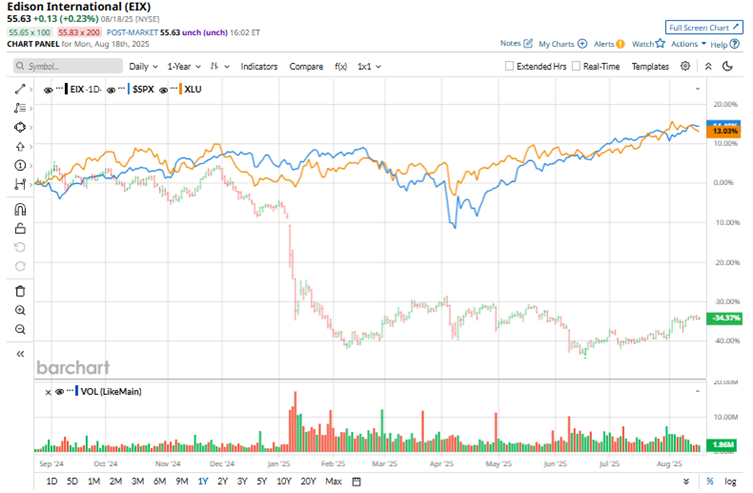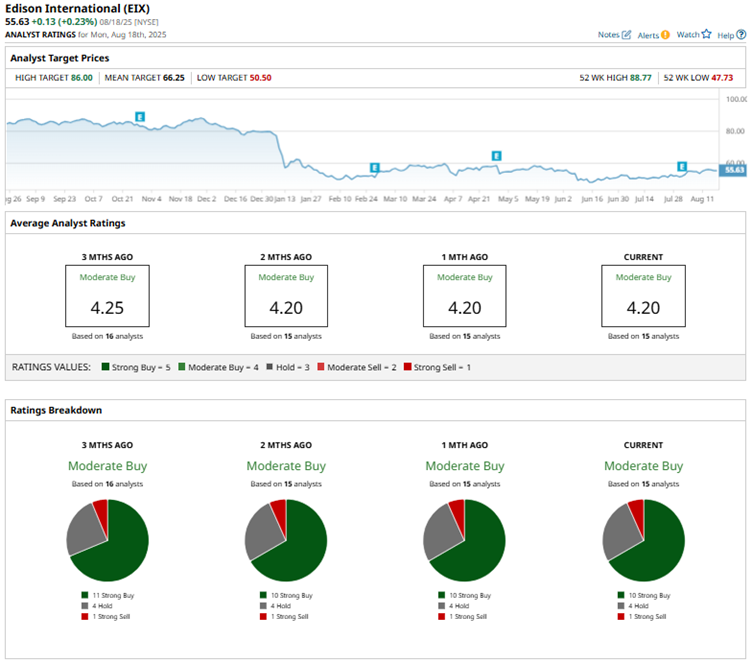
Based in Rosemead, California, Edison International (EIX) is a major energy company operating primarily through its subsidiary, Southern California Edison (SCE), which supplies electricity to millions of people across coastal, central, and southern California.
The company is committed to clean energy, investing in the modernization of the electric grid and the expansion of renewable power sources. Edison International also explores innovative energy technologies, aiming to support the transition to a low-carbon economy and promote long-term sustainability throughout its service areas. It has a market capitalization of $21.36 billion.
Over the past 52 weeks, Edison’s stock has declined by 33.3%. It had reached a 52-week high of $88.77 back in Sep. 2024, but is now down 37.3% from this high. This year, the stock is down by 30.3%. The stock has underperformed the broader S&P 500 Index ($SPX), which has gained 16.1% and 9.7% over the same periods, respectively.
Focusing our attention on the company’s sector, we observe that the stock has also lagged behind the Utilities Select Sector SPDR Fund (XLU), which has gained 14.5% over the past 52 weeks and 12.6% year-to-date (YTD).

The stock’s downturn is most likely a result of the massive Eaton fire earlier this year. In addition, concerning the 2020 Bobcat fire, the SCE had to pay $82.5 million in settlements to compensate taxpayers for firefighting expenses and environmental restoration costs, as it was accused of negligence in maintaining its infrastructure.
Nevertheless, Edison’s stock popped nearly 2% after the company reported strong second-quarter results on Jul. 31. Its quarterly operating revenue increased by 4.8% year-over-year (YOY) to $4.54 billion, which was higher than the $4.19 billion that Wall Street analysts were expecting. The company reported core earnings per share of $0.97. While this figure was lower than the $1.23 reported a year earlier, it was higher than the $0.88 that analysts had expected.
For the current year, ending in December 2025, Wall Street analysts expect a 23.1% YOY growth in its EPS to $6.07 on a diluted basis. The company has a mixed history of surpassing consensus estimates, topping them in three of the trailing four quarters and missing them on one occasion.
Among the 15 Wall Street analysts covering Edison International’s stock, the consensus is a “Moderate Buy.” That’s based on 10 “Strong Buy” ratings, four “Hold” ratings, and one “Strong Sell” rating.

The configuration of the ratings is less bullish than it was three months ago, with one less “Strong Buy” rating.
After the company reported better-than-expected results for Q2, Barclays analyst Nicholas Campanella raised the price target on Edison International from $64 to $65, while maintaining the firm’s “Overweight” rating on the stock.
Edison’s mean price target of $66.25 indicates a 19.1% upside over current market prices. The Street-high price target of $86 implies a potential upside of 54.6%.







